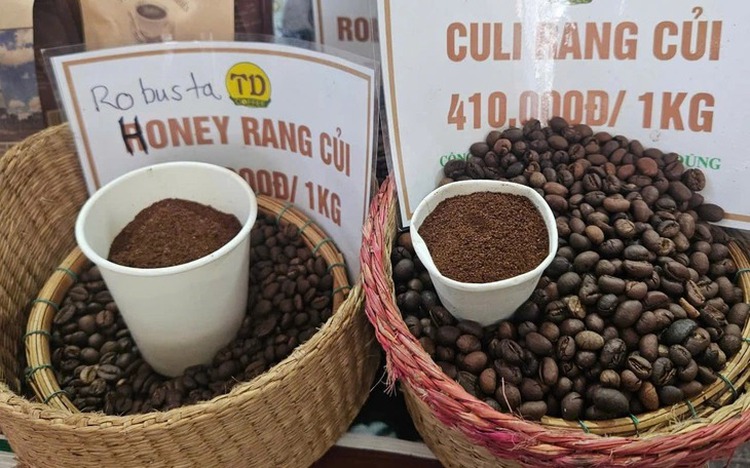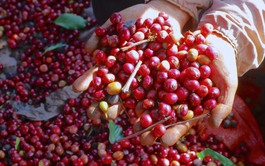
Robusta Honey (R) and Culi coffee, two varieties commonly exported from Vietnam, on sale at a local market. Photo: N. Tri / Tuoi Tre
Both domestic coffee trading prices and export rates have shown an upward spiral in recent times.
Domestically, coffee bean prices reached up to VND129,700 (US$5) per kilogram on Monday – an increase of VND5,000–6,000 ($0.19–0.23) compared to the previous week, according to The Gioi & Viet Nam (World and Vietnam) newspaper.
Regarding the export segment, Vietnam's coffee prices have remained positive.
VICOFA’s mid-April report indicated that the average export price of Robusta coffee, Vietnam’s primary variety, reached $5,415 per metric ton.
In the first half of April, Vietnam exported 79,163 metric tons of green coffee beans, generating over $437.73 million in revenue.
This represents an 8.5-percent increase in volume and a 68.8-percent rise in value compared to the same period last year.
Of this, Robusta coffee exports accounted for approximately 72,000 metric tons, earning over $390.27 million and reflecting a 6.5-percent increase in volume and a 62.3-percent rise in value year on year.
Overall, Vietnam earned around $2.8 billion from coffee exports in the first quarter of this year, with an average export price of $5,614 per metric ton, or a sharp 73.9-percent year-on-year increase.
Conversely, international coffee prices on global exchanges have shown a downward trend in the first half of April, driven by global trade tensions and recent reciprocal tariffs imposed by the U.S.
Specifically, on the London coffee exchange, prices at times dropped to around $4,800 per metric ton, the lowest in several months.
Similarly, after peaking, Arabica coffee prices on the exchange also experienced significant declines.
However, many businesses believe this price drop is short-lived as the world’s coffee industry would fare better.
A VICOFA representative noted that Brazil is currently in the Robusta coffee harvest season while the Arabica harvest is set to commence next month, potentially increasing global supply.
However, global coffee prices have not declined as much as previously anticipated.
This indicates that global coffee supply remains insufficient, as some major producing countries have not achieved expected yields due to adverse weather conditions, the representative stated.



Max: 1500 characters
There are no comments yet. Be the first to comment.